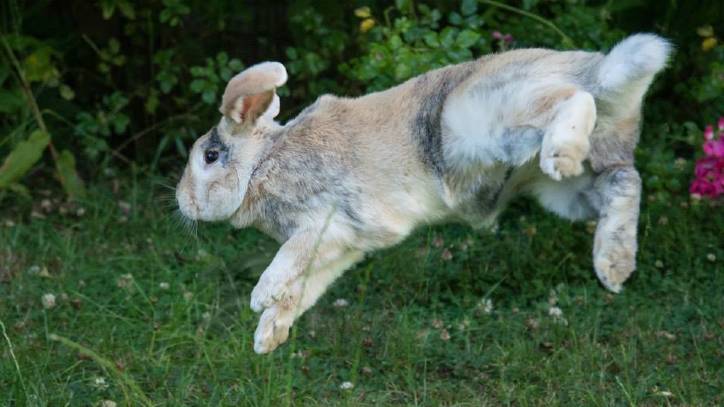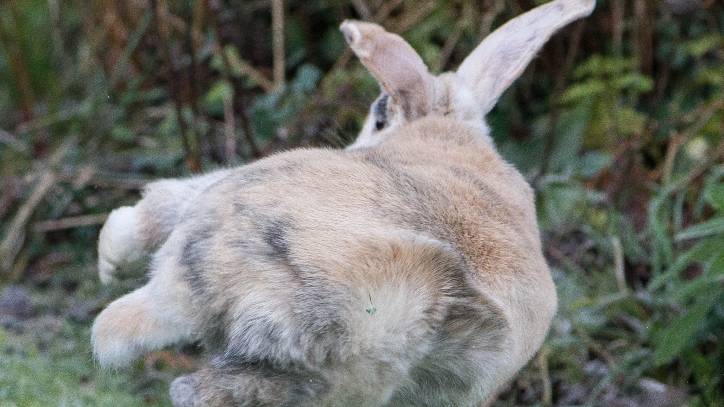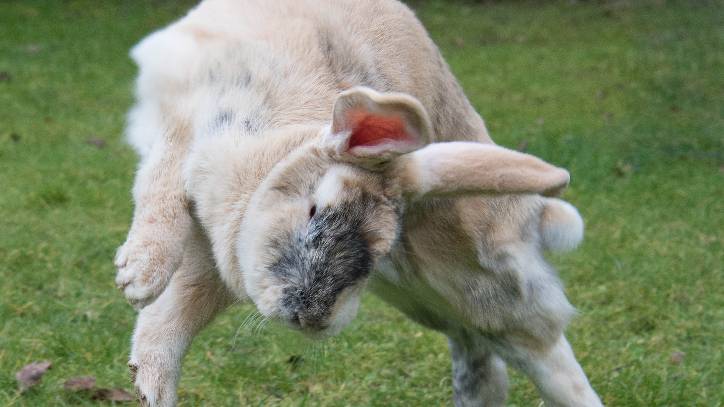Bunny binkies: Why rabbits binky and how to encourage it
"Bunny binkies" is a behavior rabbits perform to express happiness. Learn how to recognize it and when it is shown

Rabbit binkying, also affectionately known as "bunny binkies," are one of many different behaviors rabbits exhibit to demonstrate how they feel. They can communicate with us by, for example, showing signs that they feel scared, happy, relaxed, or interested in something, and understanding what your rabbits are saying is important to ensure you give them the best quality of life possible.
Many of these behaviors are only possible if rabbits are given adequate environmental space. The best indoor rabbit hutches allow rabbits to take at least 3 consecutive hops, stand on their hind legs and lie at full stretch. They must be open 24 hours a day, allowing the rabbits access to a larger area.
When housing rabbits outside, remember their enclosure needs to be at least 3m x 2m x 1m high. Hutches can be used, but must be viewed as a ‘resting’ area, with access to a large enclosure at all times.
What is a binky?
Binkying is when rabbits leap into the air, sometimes from a standstill and sometimes whilst running. They flick their back legs and head, in order to kick their back legs out. They may run around at full speed in-between binkying, and can perform a 180 degree turn mid-binky!

What does it mean when a rabbit is binkying?
Rabbits binky when they are happy, relaxed, feel safe and want to let off some steam. It is also thought to be a ‘practice run’, for if they needed to escape from a predator.
Some rabbits may perform the behavior if they know their favorite treat is on the way, or if they have access to a new grazing area in their enclosure, others may do it for no apparent reason, but it is nothing to worry about and a sign your rabbits are feeling fantastic.
Do rabbits binky in the wild?
Yes, rabbits do binky in the wild; it is a natural behaviour for them, and as wild rabbits face far greater risk of predation than our pet rabbits do, the behavior of binkying, in order to perfect the art of escape, makes sense.
Get the best advice, tips and top tech for your beloved Pets
Rabbits are crepuscular (most active in dim light, at dawn and dusk), so this would be the time you would most likely observe binkying in wild rabbits.
Why has my rabbit stopped binkying?
As rabbits binky when they are happy and relaxed, a rabbit who has stopped binkying may feel scared, threatened, lonely, in pain or ill:
1. Physical impairment
The first thing to do is to get your rabbit checked out by a veterinary surgeon, to make sure they is no physical reason, such as pain in the hips or spine, or pododermatitis (sore hocks), which would make it difficult and painful for a rabbit to binky.
2. Loneliness
If your vet gives your rabbit the all clear, then consider other reasons. Have they recently lost a companion rabbit? If this is the case, then a new companion should be considered as soon as possible.
Contact your local rescue center to see what suitable rabbits are available, and they may also be able to help with bonding the rabbits together, since this should only be undertaken by experienced individuals.
3. Change in environment
Have you changed your rabbits’ environment? It may be that they are taking their time getting used to the changes and once they feel happier and secure, the binkies should start again. If any predators, such as foxes or cats, have visited your garden, your rabbits will feel threatened and may stop binkying.
4. Incorrect diet
In order to feel happy and healthy, you must make sure you are correctly feeding rabbits, since a rabbit that is fed an incorrect diet is likely to suffer with digestive problems, obesity and other health concerns.
One sign of an incorrect diet is when rabbits don't eat their caecotroph droppings. You can find out more about this in our do rabbits eat their poop? guide.

How to encourage binkying
Make sure your rabbits have ample space and enrichment in their environment. There are lots of games for rabbits you might not have considered which can help to keep them both mentally and physically stimulated. Always ensure they have a companion rabbit, as rabbits rely upon another rabbit for company and to help them feel safe.
Know what makes your rabbits happy – it may be certain toys, herbs to eat, freshly picked dandelions, a certain type of hay or something else, but knowing these little things will mean your rabbits are more likely to demonstrate behaviours of happiness, including binkying.
Summary
It is a delight to see rabbits binky. It shows us that our rabbits are happy, not only in themselves, but also within their environment. If you haven’t seen your rabbits binky, then think about what improvements you may be able to make to encourage them to do so.
Claire currently works in Kettering as a Head Nurse in a practice with a high rabbit caseload, as well as frequently lecturing and writing on rabbits to both veterinary professionals and owners.

